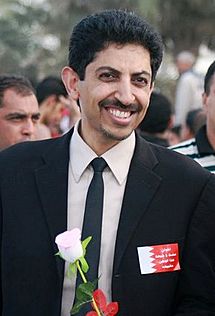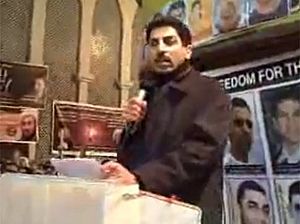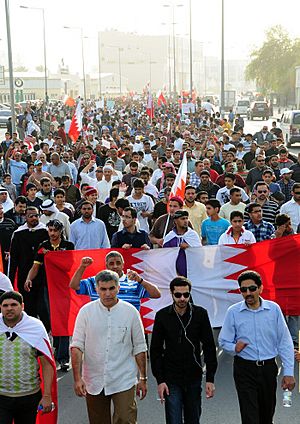Abdulhadi al-Khawaja facts for kids
Quick facts for kids
Abdulhadi al-Khawaja
|
|
|---|---|

Abdulhadi al-Khawaja taking part in a pro-democracy protest in February 2011
|
|
| Born |
Abdulhadi Abdulla Hubail al-Khawaja
5 April 1961 |
| Nationality | |
| Occupation | Human rights defender |
| Years active | 1979–present |
| Criminal charge(s) | organizing and managing a terrorist organization, attempt to overthrow the government by force and in liaison with a terrorist organization working for a foreign country and the collection of money for a terrorist group |
| Spouse(s) | Khadija Almousawi |
| Children | Maryam and Zainab 2 other daughters |
Abdulhadi al-Khawaja (born 5 April 1961) is a Bahraini activist who works to protect human rights. He has spent many years speaking up for people's rights in Bahrain and other countries.
In 2011, al-Khawaja was arrested during protests in Bahrain. He was later sentenced to life in prison. While in prison, he has gone on hunger strikes to protest the situation in Bahrain. He believes in peaceful ways to bring about change.
Abdulhadi al-Khawaja helped start the Bahrain Centre for Human Rights (BCHR). This group works to promote human rights in Bahrain. He has also worked with many other human rights groups around the world.
Contents
Early Life and Activism
Abdulhadi al-Khawaja finished high school in Bahrain in 1977. He then went to the UK for more studies. In 1979, he joined student activities in London. These activities were in response to protests and arrests happening back in Bahrain.
Many students, including al-Khawaja, were told their passports would not be renewed. They were asked to return home. In 1980, after some friends were arrested, al-Khawaja decided to stay abroad. He was worried about being arrested if he went back to Bahrain.
Activism from Abroad
In 1981, the Bahraini government arrested many people. They claimed to have stopped a plan to overthrow the government. Hundreds of people, including young students, were arrested and mistreated.
In 1991, al-Khawaja was given political asylum in Denmark. This meant he could live there safely. In 1992, he and other Bahrainis living abroad started the Bahrain Human Rights Organization (BHRO) in Denmark.
The BHRO worked hard to promote human rights. Their efforts helped bring about political changes in Bahrain. In 2001, al-Khawaja returned to Bahrain after a general amnesty. This meant he would not be punished for his past actions.
Human Rights Work in Bahrain
After 12 years away, Abdulhadi al-Khawaja came back to Bahrain in 1999. This was after the government made some changes. These changes allowed independent human rights groups to operate. Al-Khawaja became a main founder and director of the Bahrain Center for Human Rights (BCHR). It was officially registered in 2002.
Al-Khawaja also helped start the Bahrain Unemployment Committee. This group worked on issues related to jobs. Since his return, al-Khawaja has faced arrests and physical attacks because of his human rights work.
First Arrest and Release
On 25 September 2004, the BCHR was closed down. Al-Khawaja was arrested the next day. He had spoken publicly about concerns regarding the prime minister and the government. He talked about issues like corruption and human rights problems.
He spent two months in prison. During this time, his supporters held protests in Bahrain and abroad. On 21 November, he was sentenced to one year in prison. However, later that day, the King gave him a Royal Pardon, and he was released. The BCHR is still banned by the government but continues its work.
Protests and Further Arrests
On 15 July 2005, police tried to stop a peaceful protest. This protest was about unemployment and the government's budget. Security forces broke up the demonstration. Many people needed hospital treatment, including Abdulhadi al-Khawaja.
On 2 February 2007, al-Khawaja was arrested again. He was arrested with other activists. They were accused of trying to change the political system. They were also accused of spreading false information and insulting the King.
Hundreds of supporters protested these arrests. They clashed with authorities. Police used tear gas and rubber bullets. Roads were blocked, and some protesters set tires on fire. Al-Khawaja and the other activists were later released on bail. They believed their release was due to the protests and strong support from opposition groups.
In January 2009, al-Khawaja gave a speech. He spoke about human rights issues in Bahrain. These included unfair treatment, corruption, and limits on freedom of speech. He called for peaceful resistance and civil disobedience. Because of this speech, he was charged with trying to change the political system by force. He was also accused of spreading false news.
Role in the Bahraini Uprising
In 2011, many protests happened in the Middle East. This period was called the Arab Spring. Abdulhadi al-Khawaja led peaceful protests in Bahrain. He also organized activities to teach people about human rights.
Protesters gathered at the Pearl Roundabout. The government allowed them to continue for a while. However, after protesters entered the Financial Harbour on 13 March 2011, the government began a strong crackdown.
Arrest and Imprisonment
On 9 April 2011, al-Khawaja was arrested. His daughter reported that armed police broke into their home. They attacked her father and took him away. He was unconscious. His two sons-in-law were also arrested. His daughter, Zainab, was also attacked when she tried to help.
Al-Khawaja was held in detention. There were reports of mistreatment and serious injuries. He needed an operation for head injuries.
On 8 May 2011, al-Khawaja was put on trial by a military court. He was tried with 20 other Bahrainis. They were accused of organizing a group to overthrow the government. They were also accused of collecting money for this group. Most of those on trial were from Bahrain's majority Shia community.
On 22 June 2011, al-Khawaja and eight others were sentenced to life imprisonment. His daughter, Zainab, said that after the sentence, her father raised his fist. He shouted, "We shall continue on the path of peaceful resistance!"
Hunger Strikes
On 8 February 2012, al-Khawaja began a hunger strike. He said he would continue until "freedom or death." He was protesting the ongoing detentions in Bahrain. By 15 March, he had lost a lot of weight. He had trouble talking and standing.
His family said he was taken to the hospital several times. Doctors had difficulty giving him IV fluids. He refused medical exams and threatened to stop drinking water. Danish diplomats confirmed his health was declining. His lawyer said he would not stop until he was released or died.
The government said his condition was stable. They claimed he was receiving medical care. They also said he was taking glucose and other liquids.
On 20 April, al-Khawaja refused all fluids, including water. He asked to see his lawyer to write a will. He wanted people to continue peaceful resistance if he died. On 25 April, his wife learned he had disappeared from his hospital bed. On 29 April, it was revealed he had been given medicine and fed through a tube. Al-Khawaja considered this forced feeding to be mistreatment.
On 28 May 2012, al-Khawaja ended his hunger strike. It had lasted 110 days.
On 16 November 2021, al-Khawaja started another hunger strike. This was due to ongoing issues with prison authorities. On 18 November 2021, his blood sugar level dropped very low.
International Support
Many governments and human rights groups have criticized the trials and sentences. They say the trials were unfair and politically motivated. The UN High Commissioner for Human Rights expressed serious concerns. They said the rights of the defendants were not respected. They called for an end to trials of civilians in military courts. They also asked for the release of peaceful protesters.
Amnesty International called the trials unfair. They noted that claims of mistreatment were not investigated. They also said false confessions were used as evidence. Amnesty International officially called al-Khawaja a prisoner of conscience on 30 March 2012. They demanded his immediate release.
During his hunger strike, the Danish foreign minister met with Bahrain's foreign minister. He called for al-Khawaja's release. Front Line Defenders also started a campaign for his release. More than 50 human rights organizations asked the King of Bahrain to release him.
On 9 April, UN Secretary-General Ban Ki-moon asked Bahrain to consider transferring al-Khawaja to Denmark for medical treatment. However, Bahrain's Supreme Judicial Council refused. They said it would break Bahraini law. The United States also expressed concern for al-Khawaja's well-being. They asked the Bahraini government to find a solution for his case.
In March 2021, human rights groups worldwide called for al-Khawaja's release. Reports showed he had been mistreated and kept alone for long periods.
The European Parliament passed a resolution about Abdulhadi al-Khawaja. They urged Bahrain to uphold the rights of detainees. They also called for his immediate and unconditional release. The resolution condemned the prison administration for ongoing human rights violations against him.
See Also
- Bahrain Centre for Human Rights
- Torture in Bahrain
- Bahrain Thirteen
- Nabeel Rajab
 | Anna J. Cooper |
 | Mary McLeod Bethune |
 | Lillie Mae Bradford |



